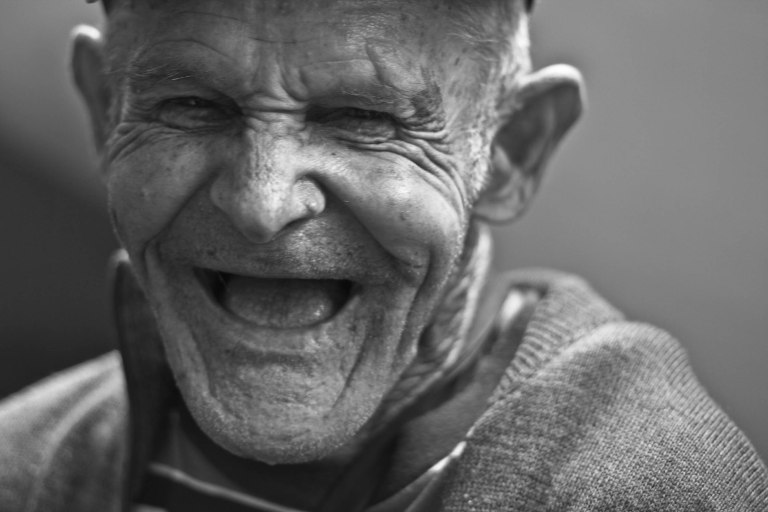Life gives you lemons and throws you curved balls.
The kind of lemons that squirt you right in the eye and the kind of curved balls that hit you straight in the sensitive parts. Life’s a bitch, a dick, an asshole; like “why are you treating me like this?!? Stop!! AAAAaaaaaah! It hurts!”
At least sometimes. Quite often, depending on your circumstances and your mindset. At other times it’s fucking amazing, magnificent, beautiful, awe-inspiring, full of love and oh my goooooood I’m SO in love with life!
And then there’s everything in between, too.
I believe the secret to “winning at life” lies in learning to embrace the former end of the spectrum and to stop fighting the inevitable dark times. It’s all part of the same coin.
So what I want to share with you in this (rather long) article (broken down into parts on my website’s blog) are small bits of wisdom, food for thought, some practical life advice and other nuggets that I’ve distilled from a decade of working with coaching clients, training and supervising life coaches, hours of debate with my students at the MSc Applied Positive Psychology and Coaching Psychology (MAPPCP) at the University of East London, my own degrees in Applied Positive Psychology (MSc) and Existential Coaching (MA) and countless hours of introvert contemplation as well as passionate almost-arguments with beloved friends and colleagues. I hope you’ll find some value in these words and I’d be delighted if you shared some of your thoughts or comments.
Life has so much to offer when we learn to embrace the space outside of our comfort zones and make courageous choices and that’s exactly what this article is about: Learning to love life when life kicks you in the gut!
That’s the positive-existential way to achieve lasting happiness.
1) Redefine Happiness!

Happiness is like love: ask 20 people what it is and you will get 20 different answers.
So, what is happiness to you? Take a moment to reflect….
…
…
Now if, for you, happiness is about feeling wonderful, filled with positive emotions, blissfully happy and without a worry in the world, then unfortunately I have some bad news:
Nobody will ever achieve lasting happiness.
By that definition, it is a fleeting feeling, something that only ever comes and goes. You will never live “happily ever after”, because life will give you lemons and throw you a bunch of curved balls! Occasional life crises are a matter of when, not if. Yet despite the fact that we’ll most certainly experience dark and rainy days, some people seem to keep smiling even in dark times. So what’s their secret?
Here’s my take on how to achieve lasting happiness.
It is for those who choose to see the world as it is, for those who are willing to learn to not just manage, accept and endure, but embrace life’s many challenges and those who are courageous enough to really live and get the most out of their time on this planet.
Existential Happiness
Existentialists believe that anxiety is an inevitable part of being alive; that the simple act of being human comes with a set of inner conflicts, dilemmas and paradoxes, the “human condition. Existential thinkers agree that we cannot exist (or be there – “Dasein” as the German Philosopher Heidegger calls it) without experiencing some uncomfortable feelings. We can feel ‘good’ for some time (e.g. after we achieve something, while having fun with a friend,when we do something we’re really good at or when we’re otherwise distracted), but sooner or later we’re bound to feel sad, disappointed, frustrated, hungry, disillusioned, confused or doubtful; usually when we have time to sit still, think deeply about our existence and allow ourselves to see our world as it really is . This is the ebb and flow of life. And it takes courage to open our eyes to it.
There is only one way not to experience any of the ‘bad’ feelings and that is simply to hide! Hide from any sort of risk and to live in denial about the basic facts of life. These facts of life can seem quite dark and gloomy when traditional existential thinkers describe them – we’re all going to die, nothing is certain, life is meaningless, hell is other people and we are essentially alone in the world. However, the positive existentialist sees a world full of opportunity, freedom and liberation! A world full of excitement, which is simply anxiety with a positive spin on it, and a whole spectrum of experiences on offer.
It’s tempting to avoid feeling bad and instead convince ourselves that death is this thing in the distant future that we don’t have to worry about, to go have some fun when we feel uneasy about an important upcoming life decision, to get drunk with friends instead of sorting your life out… But by doing these things we’re only prolonging the inevitable. At some point, we will face these certainties of life in some form or another, and instead of pushing them away, the positive existentialist appreciates the positive value inherent in them.
For example, if we are all going to die sooner or later, then we have every reason to make the most out of our time on this planet. Death, aka the ultimate deadline, is one of the strongest motivators to get shit done. If we were 100% sure about and knew everything – the football scores,, the day we die, the Game of Thrones plot or whether the date we have tonight will end in a terrible breakup a few years down the line – life would be a hell of a lot less exciting! If everyone were the same and we could all read each other’s minds and understand each other fully, relationships would lose their magic and we’d miss the diversity that makes humankind so colourful. If our existence as a whole is meaningless and there are no rules and no higher purpose or divine plan for your life, then you can make your own rules and you can do whatever the fuck you want (as long as you can accept the potential consequences to your actions, obviously).
Life really is marvellous and amazing, in all its facets. We should be grateful for each and every moment we are alive and breathing and truly grateful for the whole spectrum of emotions we experience. Of course, we don’t enjoy feeling ‘bad’, by its very nature.. But we would never call anything ‘good’ if we had never experienced ‘bad’ in the first place. It would simply be the norm. And if ‘good’ is the new ‘normal’ then ‘okay’ becomes the new ‘bad’ by comparison, and you’ll have to aim for ‘amazing’ to feel ‘good’.
Feelings come and go, so lasting happiness must be more than a fleeting positive emotion. Positive Existentialists are happiest when they’re keeping it real. They try to face life as it is, no matter how challenging or uncomfortable it may feel. Eyes wide open and letting everything in, experiencing everything that life has on offer.
That right there is the key to being able to smile through adversity anxiety and pain in life.
Facing it all courageously and embracing its dark side. There is no day without night and I want to explore it all. That’s what I call a life well-lived, a full life. That is what will make me look back before I die and think: I’ve made the most out of my time here. It’s what allows me to suffer with purpose and to be happy about every moment that I get to be on this ride. Knowing that I’m making the most of each and every second, in whatever form, feeling and experience that takes.
That’s a positive existential take on happiness.
2) Feel the Burn! Embrace the Pain!

We tend to avoid feeling ‘bad’ , whether that’s in the form of hurt, anxiety, uncertainty, being uncomfortable, confused and so on. But what we so often forget is that there is a lot of value in feeling this way.
Two of my colleagues have written about this topic at length and I can recommend ‘The Positive Power of Negative Emotions‘ and ‘The Upside to Your Dark Side‘ if you’d like to dive into the science behind this claim.
‘No pain, no gain!’ says a determined bodybuilder. When you ‘feel the burn’, that’s when your muscles are growing the most. Every time life kicks you in the gut, you’ll get a little more resilient for next time, you grow muscle and a thick skin. “What doesn’t kill me makes me stronger” said existential thinker Friedrich Nietzsche. And boy was he right.
But this is only true if we embrace the pain, the hurt and the confusion. If you continue to make the same mistakes, pain is pointless. Hurt really doesn’t help. But if instead we use it as a lesson and a way of understanding how to do better next time, then pain becomes part of growth. It is necessary to achieve happiness, to know what makes you unhappy.
Heartbreak on leaving a relationship feels horrible, but it teaches you what to look for in your next partner, or how you could behave differently in your next relationship.
No one likes pain in the moment, but the positive existentialist knows that to live a full life, you can’t avoid the pain. Rather, it is to be understood, learnt from and built on to create that life of contentment that we all are searching for.
3) Don’t Distract Yourself!

When you’re feeling weird,sad or low, it’s tempting to just make it go away.
Don’t!
Instead, sit with your feelings and listen to yourself.
Emotions are like a compass; a teacher; a guide. They help you learn about what’s important to you at the deepest level , for example, if you didn’t give a shit you wouldn’t have much of a reaction. In this way, they guide you to make truly authentic decisions.
Often we know deep down what we need to do in certain situations, like ending a toxic relationship, but we also know that doing it will be uncomfortable or painful, like when you have to tell him/her, enduring the aftermath and being alone again. And so we often choose to just distract ourselves so as not to think about it. We try to get rid of that feeling until it gets to loud to ignore. And at that point it is often even harder to act – e.g. now that you guys have children or bought a house together! Now that pain you had before is even worse, and the what you wanted to do will feel even scarier.
Another good reason to avoid distracting yourself when you feel something ‘bad’ is that every moment is precious. Even, and often especially, the challenging ones. I say take them all in! They are the stories you’ll tell your grandchildren about how you overcame struggle and heartache and grew stronger as a person as a result! They become the benchmark against which you will be comparing the next time you feel great. Think being healthy after a long illness or the first warm weekend after a harsh winter, even a modestly enjoyable meal after a challenging diet. The contrast is a large part of the joy.
If you open your mind, get in touch with your emotional world and allow yourself to feel something – even if it’s uncomfortable – you will accept what life offers you. You take the gift and acknowledge it as the gift that it is. Then be grateful for it.
Distracting yourself from all the negative feelings is like only skiing half of the mountain, or travelling around the world but only visiting places you already know. It’s only one half of the story, and you’re missing out on some of the best bits by ignoring it.
Take it all in, the good, the bad and everything in between.
4) Live Mindfully!

Practicing mindfulness means taking the present moment in as it is – like most kids do. They couldn’t care less about what was or what comes. They’re fully present. That’s what their bliss is about. They live intensely – the whole spectrum.
Living mindfully goes a bit further than reverting to pre-teen years. It means not judging right now as good or bad – it just is what it is. It means allowing yourself to experience what’s coming in through your senses from the outside and what’s going on inside of you, too. Being present, aware and non-judgmental. And it is a skill that can be learned.
Meditation, with mindfulness as a form of this, is the skill of being in charge of where you put your attention.
Your brain is an extremely useful, efficient and powerful tool, but for many of us it has taken over and is controlling where our attention goes. We so often struggle to stop thinking; to just be and experience the present moment. We automatically judge each moment and feeling as something that’s either desirable or to be avoided, and then take action accordingly. This often happens completely automatically without us even thinking about it.
Next time you feel weird, sad or uncomfortable, instead of avoiding it, try sitting with it for a little while and really experience it. You know, some people cut themselves or gamble away their life earnings just to feel something. It may not feel pleasant, but you’re undeniably living life right now! Allow yourself to experience all it in full. After all, the present is all we’ve got. Yesterday and tomorrow are mere constructs in our mind.
One great resource to learn to be more mindful is this blog by my colleague Seph Fontane, full of exercises, techniques, activities and other materials. For more story-based in -depth reading on this, try Eckhart Tolle’s The Power of Now. It has transformed so many people’s lives, with a simple but powerful message: be right here, right now, and be grateful for it. Ultimately, it’s all we really ever have; we might as well get better acquainted with it.
5) Appreciate the rain!

A harsh winter makes us appreciate the sun, rain waters our plants and a few insane weeks at work make us doubly enjoy our well-deserved holiday. Happiness means nothing without the other side of life. There is no Yin without Yang. And in every ending lies a new beginning.
When you see ‘bad’ things as part of a greater whole, you will stop trying to experience only good things. This would be a futile task anyway as ‘good’ would oh so quickly simply become the new norm, and you would again need to find something better.
A core characteristic of humans, and one of the main reasons we’re dominating this planet, is our ability to adapt to almost any circumstance – good and bad. This is both a blessing (adapting to bad stuff so it doesn’t feel so bad anymore) and a curse (adapting to good stuff so it now feels normal and you need more). The positive existentialist values the whole spectrum of what life has to offer. We see the positive value in the difficult stuff as well as the downsides of the pleasant parts.
In this way, we appreciate whatever life has to throw at us. When life throws us horseshit, we put it in the garden and grow beautiful flowers with it! We do the same with life. Why not try it yourself?
Oh, and if you haven’t already, take a look at 7 reasons to appreciate the rain when life gets dark to read some more about this metaphor.
6) Keep it real!

Keep an open mind and your eyes peeled!
Every now and then, remind yourself that life is short!
Question what you take for granted!
We tend to try and avoid feeling uncomfortable quite automatically. As a result, we “urn a blind eye, focus on the positives, surround ourselves with people with similar political views and cultural heritage who don’t challenge our views, and choose to believe that article we read that claimed that pizza prevents cancer and we should drink red wine daily to stay healthy.
We lie to ourselves all the time in order to feel better about who we are and what we do.
While this does a great job of keeping us comfortable, it prevents us completely from seeing things as they are. We build up these positive illusions that will sooner or later be challenged by somebody or something.
For example, if I get up every morning and tell my mirror image “you are the best thing that has ever happened to this world. You are kind and giving and have everybody’s best interest at heart. Everybody loves you for who you are”, I do this for several months and only surround myself with people with a positive attitude, then I will start to be that person.
But if one day I lose my job, get a bad review or somebody gets angry at me because of something I did, this little bubble will burst. At that point, many people will explain this away so they can hold on to their positive self-image.
The positive existentialists, though, will allow themselves to be challenged. We accept the reality of what happened and use it to learn and grow, to see the world more as it is, rather than we would ideally like it to be.
For everything that you believe is right, good and moral, there will be somebody in the world who thinks you are a despicable human being. For every world-embracing hippie, there is a cynical bastard who thinks that guy is an idiot. For every socialist, there’s a capitalist and even Hitler was probably convinced in his deranged mind that he was doing the world a favour.
Everyone looks at the world differently and sees themselves in a different way. Make sure that when you look in the mirror, you keep it real with yourself. In the end, you aren’t fooling anyone but yourself.
7) Take a leap of faith!

We make decisions with ease when we’re sure about the outcome. But the reality is that the future is uncertain. Because of this, we often find ourselves anxious and at times terrified about upcoming events, for example. an important career move, chatting up an attractive stranger in a bar or even just making the best possible choice from the restaurant’s menu.
It can be gruelling not to know how our choices will affect us. Small decisions can have tremendous knock-on effects. And while we can minimise risks through good preparation, training, experience and so on, we can never be completely safe.
Every single day has the potential to completely flip your life upside down, no matter how carefully you planned it. We can structure our days and lives in ways so they become more predictable to avoid any surprises that throw us off-balance…
But I like surprises!
I enjoy being slightly out of balance, challenged, excited, a little tense even. Life would be extremely boring if we knew everything that was going to happen. Imagine you knew the exact date and time of your death, the outcome of the football, the precise taste of every meal or the ending to Game of Thrones. We hate spoilers, yet we love certainty. Work that one out!
Well, Søren Kierkegaard, one of the first existential philosophers, proposed that in the face of uncertainty, we take a leap of faith. We let go of our need for certainty and accept that we can never be 100% sure about anything. In actual fact, this makes the world an exciting place and life worth living.
Faith in this context has little to do with religious faith, but is simply an acknowledgment that we don’t know the future, but march forward anyway.
So whether you are certain or not, take a leap of faith and try to enjoy the variety and uncertainty of life!
8) Prepare for the worst, hope for the best!

Let’s talk about optimists, pessimists and realists for a moment. And how we could get the best out of all of them.
Optimists always expect the best outcome and are generally extremely positive about the future. Why do they do this? Because it helps them maintain a happy, positive and loving mood, whilst not worrying too much in the face of potentially challenging situations. The downside is that it can also lead to being ill-prepared for upcoming events due to the expectation that everything will always be okay.
On the other side of the coin, pessimists convince themselves that the outcome is going to be terrible or much more challenging than is likely or realistic. As a result of this kind of thinking, they prepare better and are grateful for any outcome better than the total catastrophe they expected. Whilst this means that they won’t be disappointed, the downside is that they very often feel anxious leading up to events, and life can become a big feeling of anxiety, going from one assumed catastrophe to another.
People often ask me where realists come in to the conversation, because whilst none of us want to be pessimists, it seems that equally people don’t want to be optimists either: they want to see the world as it is, rather than build positive or negative illusions.
The thing to know about realism is that it doesn’t have the sort of emotional pull that comes from expecting the best (being excited and looking forward) or the worst (preparing out of fear).
Ultimately, existentialism is all about seeing clearly. But this doesn’t mean that you need to believe nothing you do matters and that outside forces control your life. The positive existentialist will therefore prepare for the worst but hope for the best.
So, prepare as best as you can, but as soon as it’s game time, play as if you had already won. Take the best from both worlds and create a world for you that you love living in, no matter the circumstances.
9) Find the Courage to Live!

Life is hard. Reality can be hard to bear. And so it’s tempting simply not to look at it. Ignorance is bliss, right?
We have all these inner conflicts, dilemmas and anxieties which cause us a fair deal of distress each and every day if we aren’t careful. And it seems that those who aren’t willing to deceive themselves experience a lot more of this anxiety than the blissfully ignorant.
It’s true: unless we charge boldly and blindly (and arguably recklessly) into anything that presents itself and without any consideration of risk, choosing to live a full and exciting life takes a lot of courage!
Allowing yourself to experience the dark side of life is not pleasant. At times, it is downright terrible, painful and feels pointless. But living across the spectrum of human emotions means we must include all the emotions, even the difficult ones.
Nobody said it was going to be comfortable. It will be bumpy and exciting! You will scream, shout and cry out! And of course, you’ll then have a bunch of thrilling stories to tell when you get off the ride, too. Aldeous Huxley once said that he doesn’t want to come to the end of his life safe and in a well preserved body, he wants to skid in sideways in a cloud of smoke and fully exhausted proudly explaining “Wow! What a ride!”. Now that sound like someone who made the most out of his time. But that also takes tonnes of courage and facing a lot of fear.
Have you ever been on a really scary roller coaster or stood at the edge of a plane or cliff ready to jump? If so, and no matter how safe your parachute or seat belt are keeping you, you will have had that moment of doubt, a voice of reason asking you whether you’re completely mad or if you are absolutely sure you want to do this? It happens all the time in life too.
We are often hesitant about things that are going to be challenging, but when we put our fear to one side and instead engage our courage muscles, we’re usually glad that we did it. Remember, we tend to regret the things we haven’t done in life, not the things we have. And besides, growth happens in a state of discomfort, and we like growth, right?
10) Do your thing!

There will always be people out there telling you how to live your life.
And you know what, it can be tempting to go and do what they say! Especially when they tell you that they have figured things out and tell you they know how to avoid pain and discomfort, too.
We want to believe them. We want to live a comfortable, yet exciting life, full of certainty that we’re on the right track doing the right thing. We love certainty and safety so much that we buy into it all the time. It’s one of the basic principles of advertising!
The problem is that every time we do what somebody else told us to, we’re stripping away our own sense of ownership, of identity and a sense of self. Having no responsibility is great when things go wrong. The thing is that this sort of attitude makes us feel kinda empty when we succeed because we won’t give ourselves credit for the good things either (at least if we’re being consistent). With lack of ownership and responsibility we feel safe but it also isn’t at all rewarding.
That’s why those who take the highest risks also get the highest rewards (provided that they are conscious about the risks they’re taking, of course!). It can be daunting to go on a path on your own, especially given our primal need to belong, but nothing feels better than carving your own way into life with the conviction that it’s yours and yours only, that you own all the results. You can feel truly proud knowing that you made it happen.
If your goal in life is to be yourself, you can’t possibly fail. So just “do you“, no matter how it compares to other people’s standards or measurements. And be proud of it, because the feeling of being you and being proud of yourself is one of the best feelings out there!
11) Choose life!

How you live your life is a choice.
You can watch life from the beach or you paddle out and surf the waves. You can build a safe house and spend as much time there as possible or you can venture out into the jungle.
No matter what kind of life you choose, it’s yours and you have to live with the consequences.
Personally, I wouldn’t want to chill out all day every day. Of course, I love it when I have a few mellow days or weeks with little to worry about other than what to eat later on. But after a little while, I find myself becoming bored and depressed. I feel as though I am wasting time that I should be using to do more meaningful things.
It is at this point where nobody can tell you how to live your life, because everybody has a different set of values and beliefs. You choose how to best spend your time. But make sure the decisions you make aren’t just to avoid the other side of the emotional spectrum. If you try to live your live as comfortably as possible, chances are you are missing out on half of what life’s offering you. And let’s be honest, nobody’s core values are really about doing as little as possible in life (with perhaps the exception of sociopathic hedonists).
If you aspire to live positively existentially, allow yourself to experience the whole spectrum of emotions that are available to you. We like achievement and may even create problems where there are none, just so that we can solve them… but success only tastes sweet if you have actually worked for it.
When you really commit to living the fullest life possible and not wasting your time in the pursuit to take away as much from life as possible will inevitably lead to failure, falling, facing your fears and stretching yourself. I don’t say that to scare you even further, no. I say it because it’s part of the rich tapestry of a full life.
It won’t always feel pleasant, but this is what life is about! You can hide and stay as comfortable as possible or you can choose the whole spectrum of feelings and get the whole spectrum of experiences.
I chose life and keep choosing it every day. What about you?
12) Fall in love with paradox and absurdity!

We are meaning making machines! What does that mean? Well, it means that human beings LOVE patterns. We like to put order into chaos, we love to understand everything and we are eager to know why shit happens – even when there isn’t in fact any meaning or pattern. We assign meaning to each and every experience, whether we are aware of it or not. Take these two image for example:


There is no triangle, really, and that is not a smiling face, but merely two dots and a D on its side. But our brain has read meaning into these images. We do that sort of thing all the time.
It can drive us nuts when we can’t make sense of something sometimes. Some people spend decades trying to figure a particular thing out. It really is in our nature to be curious and to understand. Even for things that are completely beyond our ability to comprehend, we’ll create theories and beliefs until we know and sometimes we even make ourselves belief that we know just to create a little soothing certainty, even if we kind of know that we don’t have enough information on the topic yet.
The thing is that humans are paradoxical beings. We carry a number of inner conflicts around with us as a mere result of being alive in this world with other people:
- Certainty vs. excitement of the unknown
- Change/uncertainty vs. comfort
- Freedom & liberty vs. tyranny of choice
- Meaning making vs. the ungraspability of the meaning of life
- Isolation vs. need to belong/social animals
- Death vs. avoidance or denial of death
But rather something to be avoided at all costs to keep us comfortable, these paradoxes fuel us: they make life exciting, interesting and are brilliant motivators, especially death. They give us variety, character and individuality. The contrasts help us appreciate the differences in emotions, situations and ourselves.
So rather than hypocritical beings, we are instead paradoxical creatures. This allows us to loose all judgement of ourselves and our ‘craziness’ too, which means we can just be ourselves, no matter what that might mean on each particular day, or even in each moment.
Forget needing to be normal, constant and samey, and embrace your paradoxical and brilliant self in all its absurdity. That’s the positive-existential way.
Now what is happiness to you? What’s a good life? How would it look like to make the most out your time on this planet? Take a moment to reflect….
…
…
Has anything changed compared to where you were 20 minutes ago? I’d love to hear your thoughts in the comments.
I hope you enjoyed this article. Please feel free to pass it on to those who you think may be a little too fond of staying in their comfort zone. If it’s specific parts you’d like to share hop on over to my other blog where I’ve shared all 12 parts individually. Oh, and one more actually:
13) Get a coach!
If you’d like some support learning to live more positively-existential (because yes, it’s fucking hard and it takes some time and effort to shift your mindset), an existential coach can definitely help you on that journey.
If you want to learn a little more or take advantage of my free consultation offer, come visit me at www.existential.coach or reach out via Facebook. I have a network of associate existential or existentially-informed coaches (many of which I trained myself) who will be able to help you with living more fully, more courageously and more positively towards your inevitable demise.
Coaches who want to learn more about positive psychology and existential coaching visit my Expansion page here.

